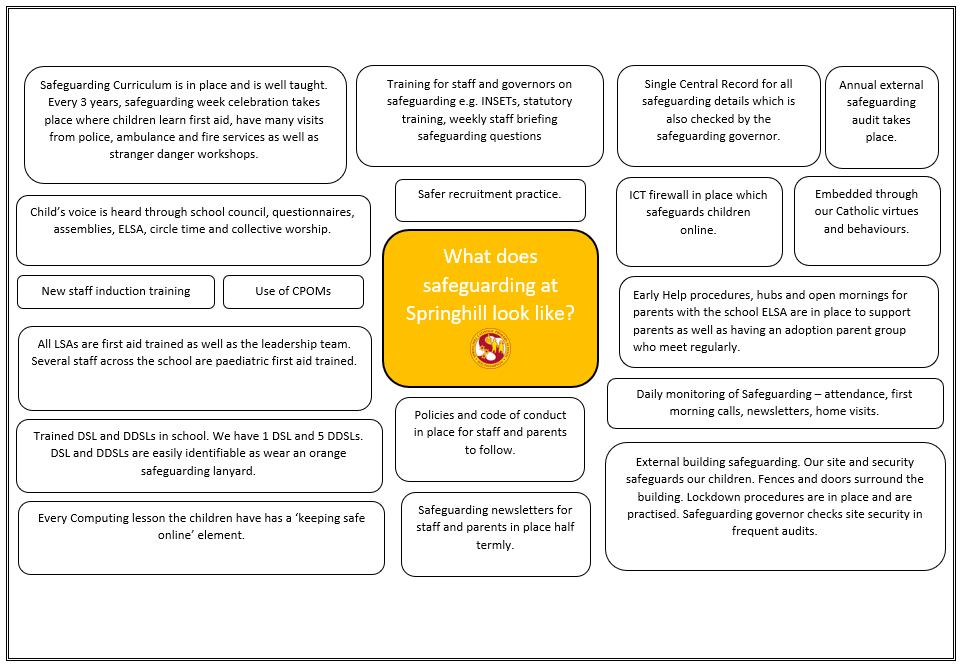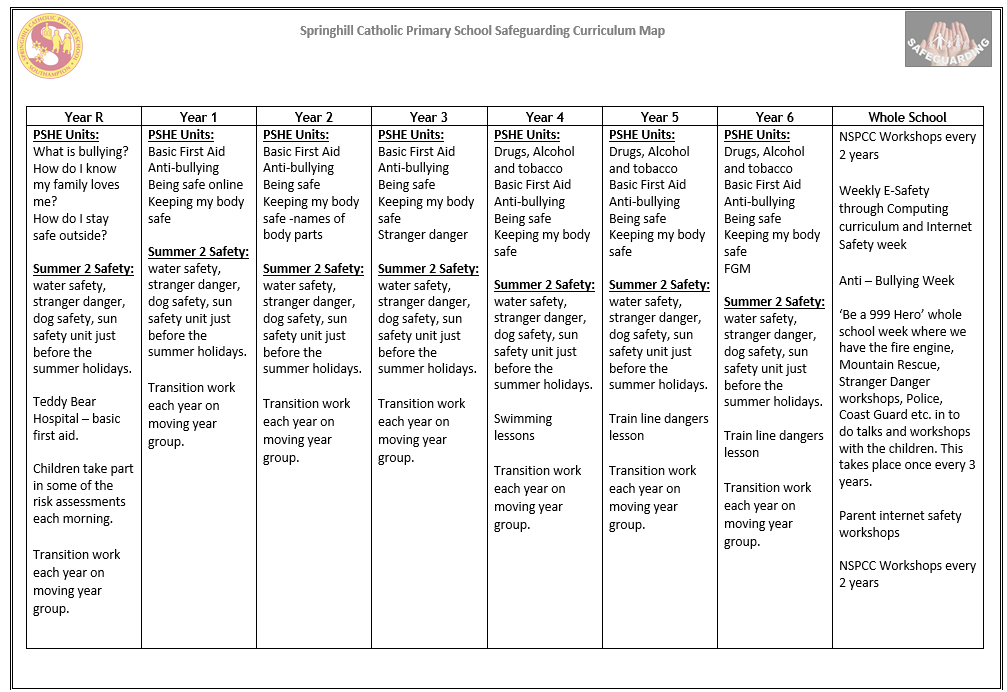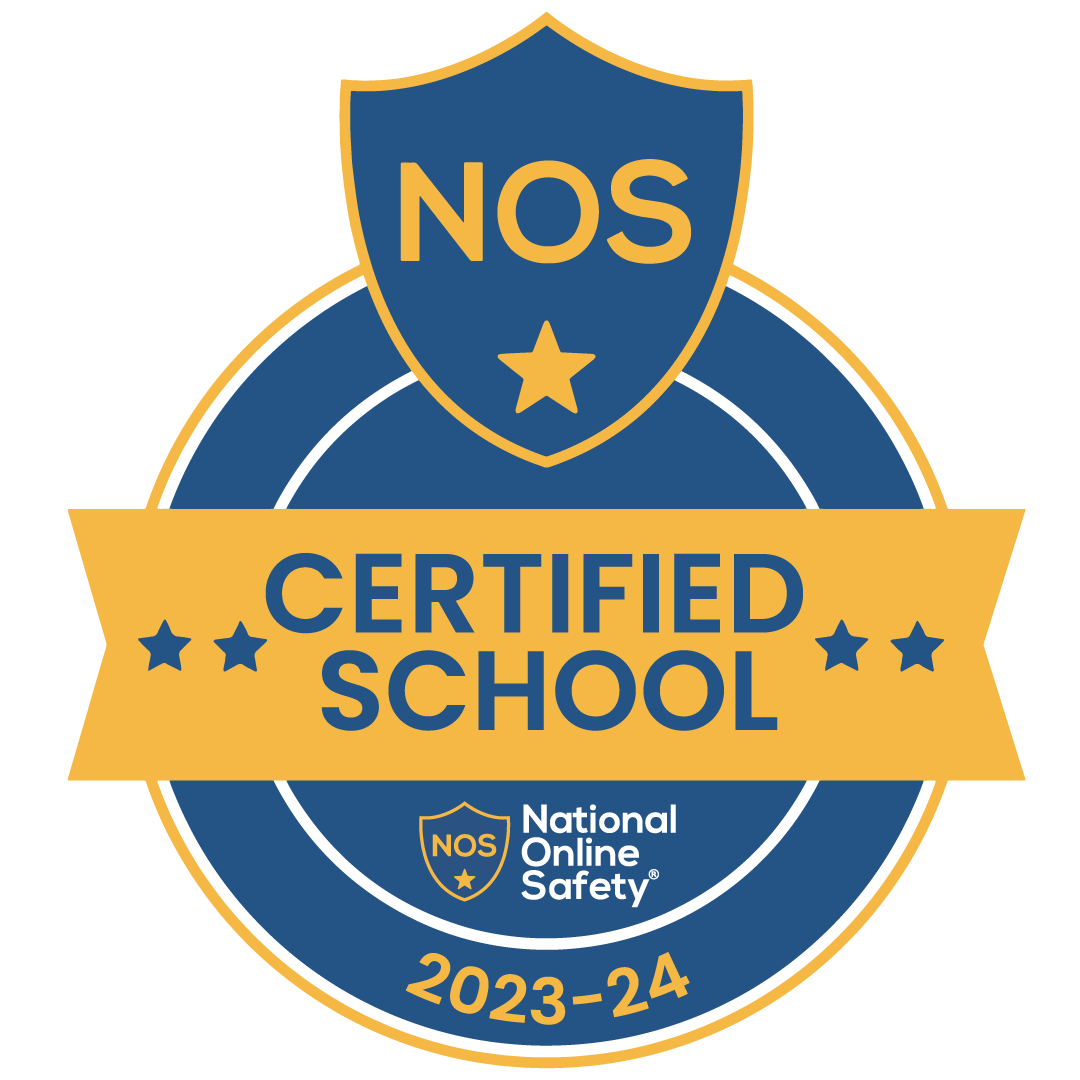Safeguarding and Online Safety
Springhill Catholic Primary School
SAFEGUARDING IS EVERYONE'S RESPONSIBILITY
Safeguarding Statement
Springhill is committed to safeguarding and promoting the welfare of children and young people and expects all staff and volunteers to share this commitment. Safeguarding is everyone's responsibility. All staff are fully trained in pupil safeguarding procedures, with regular updates and briefings.
If you have any serious concerns about your child or any other pupil at Springhill, please do not hesitate to contact the Designated Safeguarding Lead who knows who to contact for the best advice and help, and is experienced in using the appropriate degree of confidentiality.
The Designated Safeguarding Lead (DSL) for Springhill is:
Mrs Roxy Ashworth, Headteacher
The Deputy Designated Safeguarding Leads (DDSLs) are:
Mrs Jenny Hall
Mrs Helen Lacey
Mrs Sandra Keogh-Foy
Miss Holly Calver
Mrs Emily Reeves
Our Safeguarding Governor is:
Chika Ikejiube
Prevent Lead:
Roxy Ashworth
The DSL or DDSLs may be contacted on 02380333954 or via email at info@springhillcatholic.net
If you have concerns about a child, you can speak to us. The NSPCC has lots of great information which can also help you:
https://www.nspcc.org.uk/keeping-children-safe/reporting-abuse/report/
The following school policies and procedures support pupil safeguarding and welfare:

Our Safeguarding Curriculum:

Prevent
What is the Prevent strategy?
- Prevent is a government strategy designed to stop people becoming terrorists or supporting terrorist or extremist causes.
- The Prevent strategy covers all types of terrorism and extremism, including the extreme right wing, violent Islamist groups and other causes.
How doe the Prevent strategy apply to schools?
- From July 2015 all schools (as well as other organisations) have a duty to safeguard children from radicalisation and extremism.
- This means we have a responsibility to protect children from extremist and violent views the same way we protect them from any other harm.
- Importantly, we can provide a safe place for pupils to discuss these issues, at an appropriate level so they better understand how to protect themselves.
What doe this mean in practice at Springhill Catholic Primary School?
Many of the things we already do in school to help children become positive, happy members of society also contribute to the Prevent strategy. These include:
- Having a strong Aims and Ethos which pervades our school.
- Focusing on core values.
- Exploring other cultures and religions and promoting diversity.
- Challenging prejudices and racist comments.
- Developing critical thinking skills and a strong, positive self-identity.
- Promoting the spiritual, moral, social and cultural development of pupils, as well as British values such as democracy.
We will also protect children from the risk of radicalisation, for example by using filters on the internet to make sure they can’t access extremist and terrorist material, or by vetting visitors who come into school to work with pupils.
Different schools will carry out the Prevent duty in different ways, depending on the age of the children and the needs of the community.
Isn’t my child too young to learn about extremism?
The Prevent strategy is not just about discussing extremism itself, which may not be appropriate for younger children. It is also about teaching children values such as tolerance and mutual respect.
The school will make sure any discussions are suitable for the age and maturity of the children involved.
Is extremism really a risk in our area?
Extremism can take many forms, including political, religious and misogynistic extremism. Some of these may be a bigger threat in our area than others.
We will endeavour to give children the skills to protect them from any extremist views they may encounter, now or later in their lives.
Further information
Contact the school - If you have any questions or concerns about the Prevent Strategy and what it means for your child, please do not hesitate to contact the school.
See our policies - You will find more details about radicalisation in our safeguarding policy, available on our website. We also have information about spiritual, moral, social and cultural development and British values.External sources - The following sources may also be useful for further information:
Key Terms
Extremism – vocal or active opposition to fundamental British values.
Ideology – a set of beliefs
Terrorism – a violent action against people or property, designed to create fear and advance a political, religious or ideological cause
Radicalisation – the process by which a person comes to support extremism and terrorism
Online Safety Learning Resources
The DfE have updated their guidance for parents and carers to keep children safe online. This guidance contains resources for parents and carers to help keep their children safe online. Click to view the guidance: https://www.gov.uk/government/publications/coronavirus-covid-19-keeping-children-safe-online/coronavirus-covid-19-support-for-parents-and-carers-to-keep-children-safe-online#:~:text=It%20is%20important%20to%20have,in%20details%20and%20passwords%20safe.
It is fundamental that when your child is using the internet they stay safe. They should never give out any personal information such as their full name, address or phone number when they are online, no matter whom they think they are talking to.
It is important when using the internet, children remember to be SMART:
- Safe – be safe on the internet.
- Meeting – NEVER meet up!
- Accepting – don’t accept anything (it may be a virus).
- Reliable – check your source.
- Tell – Always tell someone when you don’t feel safe.
Throughout Key Stage 1 and Key Stage 2, children are taught about online safety as part of the computing curriculum. Alongside this, online safety is embedded within all curricular subjects especially in English, PE and PHSE/RSE and through a variety of enrichment activities e.g. anti-bullying and safeguarding week. The school also uses assemblies to raise pupils’ awareness of the dangers that can be encountered online and may also invite speakers to talk to pupils about this. All children sign an acceptable use of computing document which is display in the Computing suite.
Our computing lead runs a parent workshop where you can bring your child's phone along and she will show you how to put protective measures on their phone.
Below are some useful websites to you can look at with your child at home to support to help them learn more about internet safety and test their knowledge on using the internet safely:
https://www.internetmatters.org/resources/apps-guide/
https://www.nspcc.org.uk/keeping-children-safe/online-safety/parental-controls/
https://www.esafety.gov.au/parents/issues-and-advice/parental-controls

